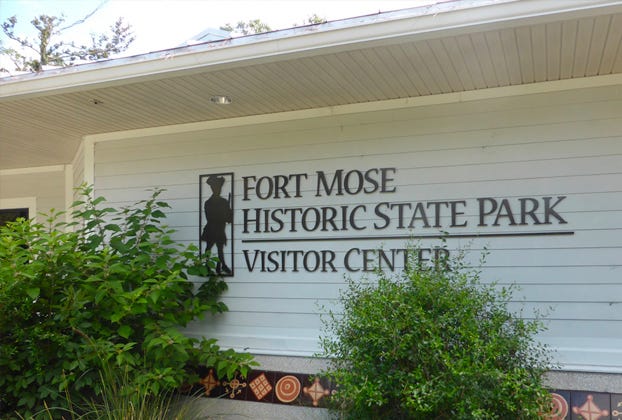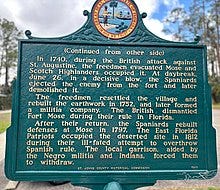Today In Black History: Fort Mose
The first official settlement for former and escaped slaves in the U.S.
Issue #634 Today In Black History, Tuesday, June 11, 2024
Help us to reach our June 2024 goals: +125 total subscribers and +75 paid subscribers:
Please share and subscribe to help us grow this publication.
If you like us, REALLY like us, please click the “Like” button at the end of this post!
Also, please scroll to the end of this post for other ways to financially support us and We Are Speaking with our books and courses.
We appreciate your support!
Today’s Black History WOW!
Fort Mose was the first free African settlement in the United States and served as a haven for escaped slaves seeking freedom from the oppressive conditions of slavery in the British colonies.
Fort Mose, originally known as Gracia Real de Santa Teresa de Mose (Royal Grace of Saint Teresa of Mose), and later as Fort Mose, is a former Spanish fort in St. Augustine, Florida. In 1738, the governor of Spanish Florida, Manuel de Montiano, had the fort established as a free black settlement, the first to be legally sanctioned in what would become the United States.
In the early 18th century, the Spanish colony of Florida offered sanctuary to runaway slaves from the British colonies. These escaped slaves were granted freedom and protection in exchange for their loyalty to the Spanish crown and conversion to Catholicism. It is estimated that 100 Africans made Fort Mose their new home. What is particularly interesting is that the residents created a new cultural community, pulling from Native American, Spanish, and English cultural customs.
Over the next 25 years, Fort Mose and Spanish St. Augustine became a sanctuary for Africans seeking liberation from the tyranny of English slavery.
The settlement of Fort Mose was strategically located just north of St. Augustine, the capital of Spanish Florida, and served as a vital defensive outpost against potential attacks from the British.
The residents of Fort Mose played a crucial role in defending the Spanish colony of Florida from British incursions during the War of Jenkins' Ear and the subsequent conflicts between the European powers. The community of Fort Mose was largely self-sufficient, with residents engaging in farming, fishing, and other trades to sustain themselves.
Fort Mose was eventually abandoned in 1763 following the Treaty of Paris, which transferred Florida from Spanish to British control. Many of the former residents of Fort Mose relocated to Cuba, where they continued to live free lives.


In 1994, the site of Fort Mose was designated as a National Historic Landmark, recognizing its significance as a symbol of African American resilience and resistance against slavery. Today, visitors to Fort Mose can explore the remnants of the original settlement, including the foundations of the fort and the nearby village.
Today In Black History
In 1889, Black inventors Purdy and Sadgwar patented the Folding Chair.
In 1911, Black Nationalist Marcus Garvey founded the Universal Negro Improvement Association.
In 1963, Alabama Governor George Wallace attempted to bodily block the court-ordered enrollment into the University of Alabama of Vivian Malone and James Hood. Wallace stepped aside later in the day when Malone and Hood returned accompanied by the National Guard.
In 1963, prompted by the attempt by Alabama Governor George Wallace to keep the University of Alabama segregated, President John F. Kennedy sent a message to Congress urging the passage of a civil rights act. President Kennedy said the United States was facing “…a moral crisis” and it was “time to act.”
In 2008, Canadian Prime Minister Stephen Harper made an official historic apology to Canada’s First Nations regarding residential school abuse where children were isolated from their homes, families, and cultures for one hundred years.
In 2009, the World Health Organization declared the H1N1 Swine Flu as a global pandemic, the first in over forty years. Dr. Anthony Fauci, the then-director of the National Insitute of Allergy and Infectious Diseases for 38 years, officially assisted President Barack Obama in successfully mitigating the effects of the disease in the United States.
Our paid subscribers are encouraged to discuss this post in our W.A.S. Chat Community.
Join Pamela Hilliard Owens’s subscriber chat
Available in the Substack app and on web
You are also welcome to view “We Are Speaking” in Substack Notes. You can also read other Substack publications without subscribing to them when you join Notes.
This post is free to read for three days. To have access 365/24/7 to our full archive, comment on our posts, and financially support “We Are Speaking” for no more than $5 per month, please subscribe at the paid level.







